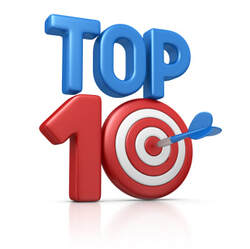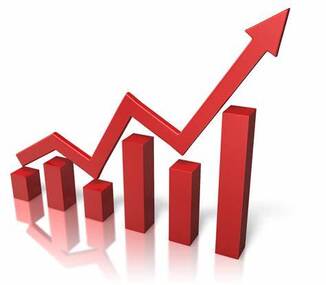|
Disclaimer: This blog talks a lot about Amazon, but we are not connected to them in any way other than they sell our books. We are definitely not being paid to mention their name and we are not recommending Amazon. We are just recounting our experiences in the hope of passing on some of the knowledge we have gained.  As an author who sells through Amazon, you will know all about “sales ranking”. If your book sells, the ranking improves and people are encouraged to buy your book because other people have bought it. And if your ranking is low, people think your book isn’t any good because other people aren’t buying it - but that is flawed logic. Just because a book isn’t selling it doesn’t mean it isn’t any good. It may just mean that nobody knows about it (we blogged about advertising last week, so we’re not going to go back over old ground). But you won’t convince some readers that a book is good if it isn’t selling and there’s not much we can do to change that mindset.  We have been fortunate over recent weeks that several of our books have sold well and their sales rankings have improved exponentially. Instead of being in the 7 digit ranking range they are into the lower end of the 5 digit range – and are still climbing. That’s for their overall, ranking of course, not the category ranking. In some obscure categories its possible to be the No 1 bestseller just by selling a single copy. So that isn’t a good comparison for the purposes of this blog. But we believe our books’ rankings should be higher still and we also believe that the way Amazon calculates their rankings doesn’t take into account a whole raft of “sales” through their own platform. I’m referring to Kindle Unlimited (KU) pages read. While they may not be direct sales, the way that a book is sold, the reader is still paying to read the book through their KU subscription and the author is still getting an income from those page reads. So, it is our contention that those page reads should be included in the calculations of sales rankings, which are an indication of the popularity of the book. KU page reads account for about two thirds of all our sales income (more for some individual titles). It is the equivalent of a lot of books sold. But Amazon doesn’t count them and there is no valid reason, as far as we can see, why they shouldn’t. In fact, it might actually be to Amazon’s benefit to include KU pages read, because the more popular a book, the more copies it sells and the more money Amazon will make from those sales. They are, effectively, depriving themselves of potential income with their current policy. I’ll use just one of our titles as an example of what we mean. "Our guestimate is that it would put the book into the top 1,000" But before we go on, a quick bit of jargon busting, for those of you who might need it. KENP means Kindle Edition Normalised Pages. It is the number of pages that Kindle Direct Publishing uses to calculate an author’s royalties for KU downloads. The more pages read in a book, the more the author gets paid. It is used to factor in the different font sizes and line spacings that authors use, which makes direct comparisons between the number of pages in a book problematic. We’re not sure how the KENP for a book is arrived at, but we suspect it may be based on character or word counts Mansplanation over, back to the blog.  Operation Absolom is the first book in Robert Cubitt’s “Carter’s Commandos” series. In July 2022 it sold 11 copies. This elevated it to around 30,000 in the Amazon rankings at the time. Although Operation Absolom is 296 pages long in paperback, its KENP is 437 pages. During July 2022, 19,215 KENP pages were read using KU. Divide 19,215 by 437 and it works out at 34 complete books. So, if 11 books sold gives Operation Absolom an average sales ranking of about 30,000, what would another 17 books give it if they were included in the figures? (BTW it actually peaked at around 10,000 - 7/7/22) Our guestimate is that it would easily put the book into the top 1,000, which makes the book look very popular indeed – as it is in reality. OK, we’re not talking J K Rowling or Lee Childs popular, but it is a lot more popular than a million other books on Amazon. "Perhaps weight of numbers might encourage a shift in policy" We could quote similar figures for the rest of the Carter’s Commandos series, because once people have read the first book it is clear they are then reading the rest of the series. But you get the idea from the one title we have used as an illustration. But it doesn’t look like that on Amazon. So, what can we do about it? We have already emailed Amazon to ask them why they won’t change the way they calculate their sales rankings. After all, they have all the data to hand and doing a new calculation that includes KENP would hardly be rocket science. This was their reply: “Sales rank is determined by a number of different inputs and may change over time. Amazon is constantly working to improve the quality of information available to our readers and authors. Please note that Sales Rank fluctuates every hour in line with customer demand and in relation to the demand for other books, both of which may vary based on factors such as popularity of new releases, seasonality, etc. Rankings reflect recent and historical activity, with recent activity weighted more heavily. Rankings are relative, so your sales rank can change even when your book's level of activity stays the same. For example, even if your book's level of activity stays the same, your rank may improve if other books see a decrease in activity, or your rank may drop if other books see an increase in activity. When we calculate Best Sellers Rank, we consider the entire history of a book's activity. Monitoring your book's Amazon sales rank may be helpful in gaining general insight into the effectiveness of your marketing campaigns and other initiatives to drive book activity, but it is not an accurate way to track your book's activity or compare its activity in relation to books in other categories. Thanks for taking time to share your thoughts about considering KENPC in sales ranking calculation. Customer feedback like yours is very important to helping us continue to improve our products and services. I appreciate your thoughts and will be sure to pass your suggestion along. Please refer to our Sales Ranking Help page for information regarding Sales Rank - https://kdp.amazon.com/help?topicId=A21KM4BNAD42EJ”  Amazon sales data - just the tip of the iceberg. Amazon sales data - just the tip of the iceberg. We emailed back to them, saying that they were undermining their own reply. If tracking the effectiveness of marketing is an important use of sale rankings, then Amazon should surely be doing its best to maximise its utility by including KENP data, because that fluctuates in response to marketing activity as well I also pointed out that by not including KENP, they were showing customers the tip of the iceberg, not the whole iceberg. They did reply once more, but only to provide platitudes. But if you are an author and your books are read using KU, then this is something that you should be concerned about as well. So why don’t you add your voice to ours and ask the same question? Perhaps weight of numbers might encourage a shift in policy Let’s face it, you have nothing to lose and your book’s sales ranking have everything to gain. But while we are on the subject of KU, would you like to help other Indie authors to maximise their income? I hope you said “yes” because it only takes a few seconds and will cost you nothing. When you get to the words “The End” in a book, there are often a few more pages left in it after that. They may be a preview of another book or an advert for other titles. It doesn’t matter. Just keep on swiping until you get to the actual end, so that the author gets paid for every last one of those KENPs. It may only be a few pennies (or cents) extra, but they add up. Even if the book wasn’t to your taste and you didn’t finish it, which is hardly the author’s fault, you can make sure they get full recompense for their work by swiping through to the end anyway. As I said, it costs you nothing but a few moments of your time. If you have enjoyed this blog or found it informative (both we hope), be sure not to miss future editions by signing up for our newsletter. We'll even send you a FREE ebook for doing so. Just click the button below.
0 Comments
Leave a Reply. |
AuthorThis blog is compiled and curated by the Selfishgenie publishing team. Archives
March 2025
|

 RSS Feed
RSS Feed